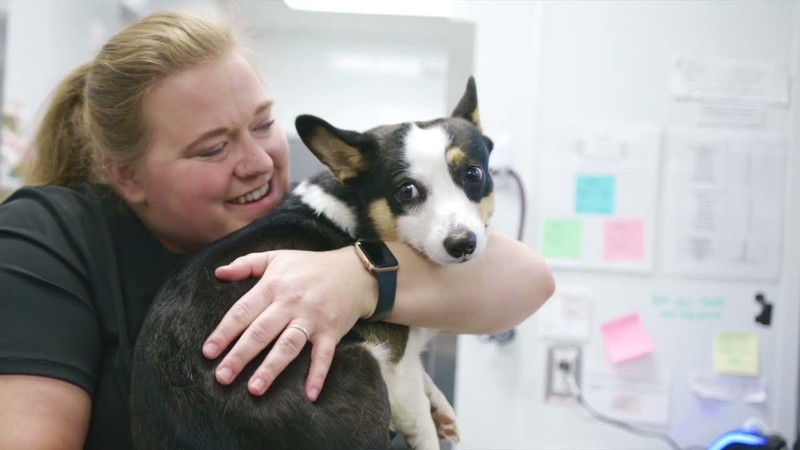While out for an evening walk with their canine companions in the Maine wilderness, a pair’s excursion took a disastrous turn, ultimately claiming the life of one member after being lost for four days.
Wife Pamela Helmstadter (72) and husband John (82) deviated from the established route and got lost while strolling through a trail near their home in Alexander on Sunday, October 13. Neither of them had a cell phone to call for help. Pamela tried to find assistance while leaving her husband behind. However, the woman became confused and couldn’t find her path back home.
She was more physically capable than he was, and they made the decision for him to stay put and her to try and go out and find help.
Sgt. Josh Beal, Maine Warden Service
Back at home, a neighbor noticed that a delivery had been left unattended at the couple’s residence. They sounded the alarm after one of the couple’s dogs returned without the owners. A team comprising game wardens and officials from the Washington County Sheriff’s Office was put together to rescue them on Wednesday, October 16. Maine Search and Rescue dogs and the Maine Forest Service later joined the team.
On Thursday, a desperate Pamela finally caught sight of rescue aircraft flying above her multiple times. Pamela was found with hypothermia, with her body temperature having dropped to 90.7F or 32.6C.
It sounds like that’s what the dog would do at night, as well, to help keep her warm. She did very well to survive for that long.
Sgt. Josh Beal, Maine Warden Service
According to the rescue team, the woman survived likely thanks to her black labrador dog, Lucy, who kept her warm throughout the period. Sgt. Josh Beal of the Maine Warden Service said that when the K-9 team located Pamela, the dog was very protective of her, lying down on top of her chest so as to keep her warm.
Pamela was then rushed to the hospital. However, her husband did not survive. His body was discovered approximately 200 yards from where Pamela was located.
Key Takeaways
A woman survived for four days in the Maine wilderness thanks to her loyal dog after she and her husband got lost while walking their dogs.
- Pamela Helmstadter’s black labrador dog, Lucy, kept her warm throughout the ordeal, likely saving her life.
- The incident highlights the importance of preparation and caution when venturing into the woods, as well as the vital role pets can play in keeping owners safe in emergency situations.
- Preparing for emergencies involves creating pet emergency kits, training pets in basic obedience skills, and staying informed about evacuation routes and shelters.
A Story of Pet Loyalty
The incident highlights the importance of preparation and caution when venturing into the woods. It also underscores the vital role that pets can play in keeping their owners safe in emergency situations.
Animals are often able to sense when their owners are in distress and will do everything they can to protect them. In this case, Lucy’s loyalty and protective instincts helped save Pamela’s life.
Her body temperature was 90.7 when she was found, but she was able to discuss what had occurred.
Maine Game Wardens
In the aftermath of Pamela’s rescue, many are praising Lucy’s loyalty and protective instincts. The same neighbor who alerted authorities about the couple’s missing status said that Lucy was “very loving” and always seemed to be by their side. This speaks to the deep bond between humans and animals, which is rooted in trust, companionship, and mutual love.
Beyond the pets can provide in emergency situations, research has shown that owning a pet can have numerous physical and emotional benefits for individuals, particularly seniors. Studies have found that pets can reduce stress levels, helping lower blood pressure and prevent chronic diseases such as heart disease and diabetes.
When the K-9 team located her, her dog was being very protective of her and even laid down on top of her on her chest.
Sgt. Josh Beal, Maine Warden Service
In addition to these health benefits, pets also provide companionship and social support, which are essential for maintaining mental and emotional well-being. For seniors like Pamela and John, a pet can be a valuable source of comfort and reassurance.
Preparing Pets for Emergency Situations
While the story of Pamela and Lucy is inspiring, it also raises questions about how we can better prepare pets for emergencies. Preparing for such situations involves practices such as creating pet emergency kits and training pets in basic obedience skills.
According to the Department of Homeland Security’s Ready campaign, among the items pet owners must include in their pets’ emergency kits are food, water, medicine, first aid kits, extra collars and ID tags, backup leashes, copies of important documents, grooming items, sanitation items, and comfort items such as toys and treats.
Make sure that your pets’ food supply is stored in an airtight, waterproof container and is enough for several days. Emergency situations such as a disaster, can last for a considerable period of time. The recent Hurricane Milton serves as a reminder of how dire such situations can be.
Likewise, it is the same for water. Be sure your pets’ emergency kits include a water supply that can last several days. Make sure to consider your pets’ daily water needs. Additionally, do not forget the related items, such as a water bowl for pets such as cats and dogs.
If your pets take medications, it is best to have an extra supply of the ones they take daily. Meanwhile, for your pets’ first aid kits, you might want to consult your veterinarian regarding your pets’ potential medical needs in emergencies.
A backup leash, collar, and ID tag are another must-have. These things break and get lost, and in emergency situations, they are more than likely to. However, while you do not have to put much care into how you store them in your pets’ emergency kits, you do have to put some thought into how you store copies of your pets’ important documents, including ones that contain their registration information. Store them in a waterproof container and digitally in the cloud.
Your pets will need some cleaning up even during such situations. Do not forget to store grooming items such as shampoo and conditioner in the kits. Then, they will also still need to do their business. Be sure to include some pet litter and litter boxes. You might also need some newspapers, paper towels, plastic trash bags, and disinfecting bleach.
Lastly, items such as toys and treats ensure that your pets’ stress levels are well-maintained even in such situations. Their mental health is as important as their physical health.
Ensuring Pets’ Swift Evacuation
After preparing the items your pets would need in emergencies, you would want to make sure they can cooperate when the time comes to evacuate. To do so, follow these tips.
First, you want to make sure that your pets are familiar with their would-be carriers. Store these carriers in places that your pets visit often. Leave them open and let your pets be comfortable around and, most importantly, in them. You might want to feed and give them treats near these carriers. Place their favorite items inside the carriers to encourage your pets to investigate the interiors. Finally, keep track of the places where your pets tend to hide so you can locate them easily for swift evacuation.
Pet Owners’ Role in Emergencies
The successful evacuation of your pets ultimately depends on you—the pet owner. Your preparedness is the determining factor of whether your pets will survive or perish. So, let’s now discuss the things that you need to do to prepare for emergencies as a pet owner in addition to the preparatory practices discussed above.
Your job is to stay informed. Map out the possible evacuation routes in advance. List out all possible shelters, and decide which ones you must reach in different scenarios. Consider the shelter’s food and water supply and their veterinary care capacity and handling equipment.
Keep watch of wireless emergency alerts. Cooperate with local officials when informed that you must evacuate. Lastly, bring your pets indoors as soon as the first sign or warning of a disaster appears, unless told otherwise by local officials.















